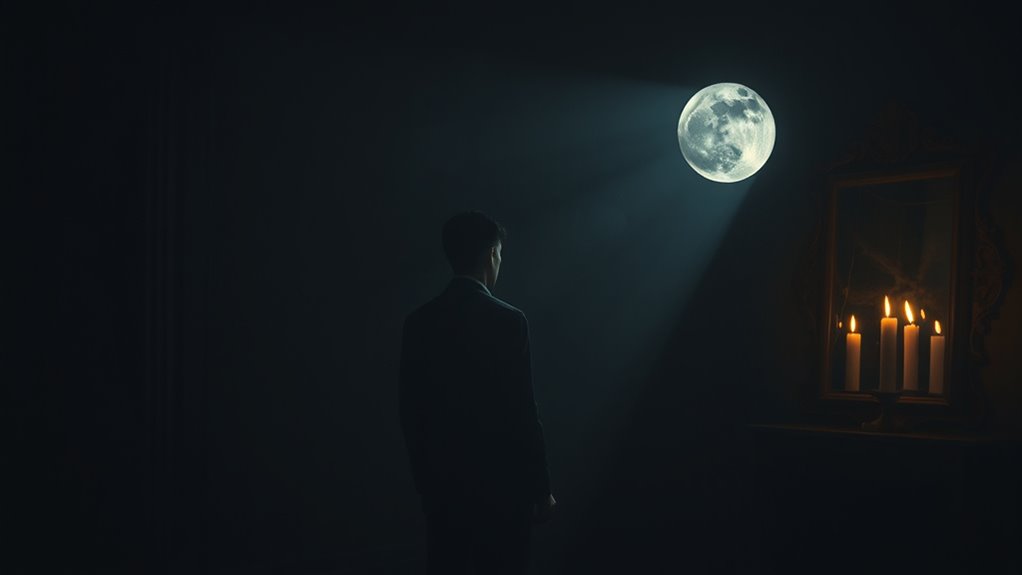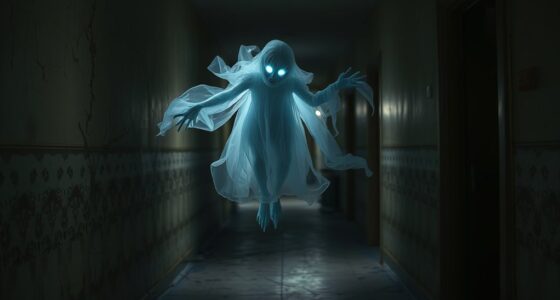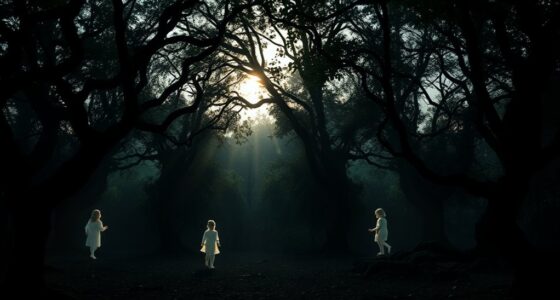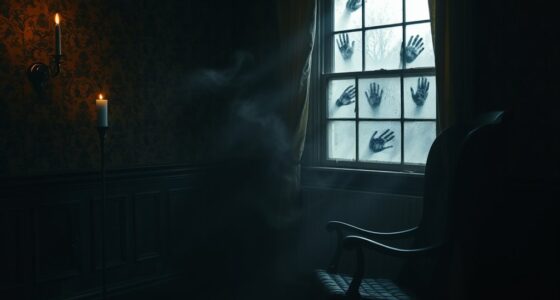Some people never see ghosts because their beliefs, cognitive styles, and personality traits influence their perceptions. Analytical thinkers, who prioritize logic, often dismiss supernatural explanations. Additionally, high extraversion and lower openness can reduce belief in the paranormal. Religious backgrounds and cultural contexts also play a role, shaping attitudes towards ghosts. Fear and environmental factors further impact perceptions. There’s a lot more to explore about why some miss these experiences, so keep uncovering the fascinating details.
Key Takeaways
- Analytical thinkers prioritize logical reasoning, making them less likely to interpret ambiguous stimuli as ghostly encounters.
- High levels of extraversion and lower openness to experience can decrease belief in ghosts.
- Individuals with a strong religious background often hold lower beliefs in ghosts due to established spiritual explanations for the afterlife.
- Psychological factors, such as emotional state and mental health, can influence susceptibility to ghostly perceptions, leading some to never experience them.
- Environmental factors, including low light and heightened fear, can distort perceptions, while those less influenced by these factors may not report ghost sightings.
The Role of Belief in Paranormal Experiences
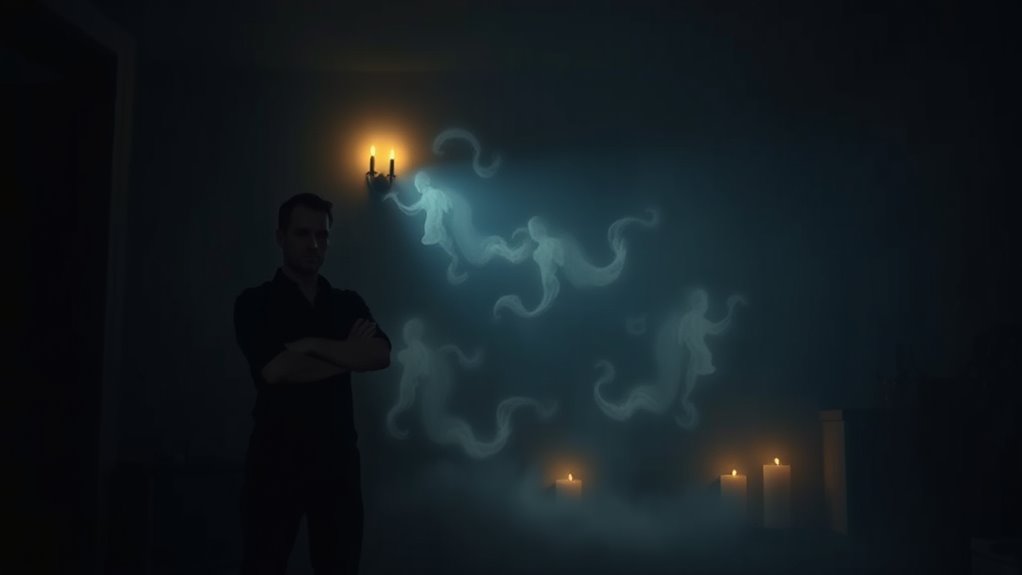
When you consider the world of the paranormal, belief plays an essential role in shaping your experiences. About 75% of Americans hold at least one paranormal belief, and this belief in ghosts greatly influences how you perceive ghostly encounters.
Belief in the paranormal shapes your experiences, with 75% of Americans embracing at least one ghostly notion.
Sociologist Christopher Bader emphasizes that your expectations and needs shape your perception in ambiguous situations. If you’re open to experience and have traits like extraversion or sensation-seeking, you’re more likely to embrace these beliefs.
Curiously, those with an intuitive cognitive style often endorse paranormal beliefs more than those who rely on logical reasoning. Your emotional state and environment can also impact your susceptibility to ghostly perceptions, especially if you’re uncomfortable with ambiguity.
Ultimately, belief can open your mind to the paranormal.
Cognitive Style: Intuition vs. Analysis
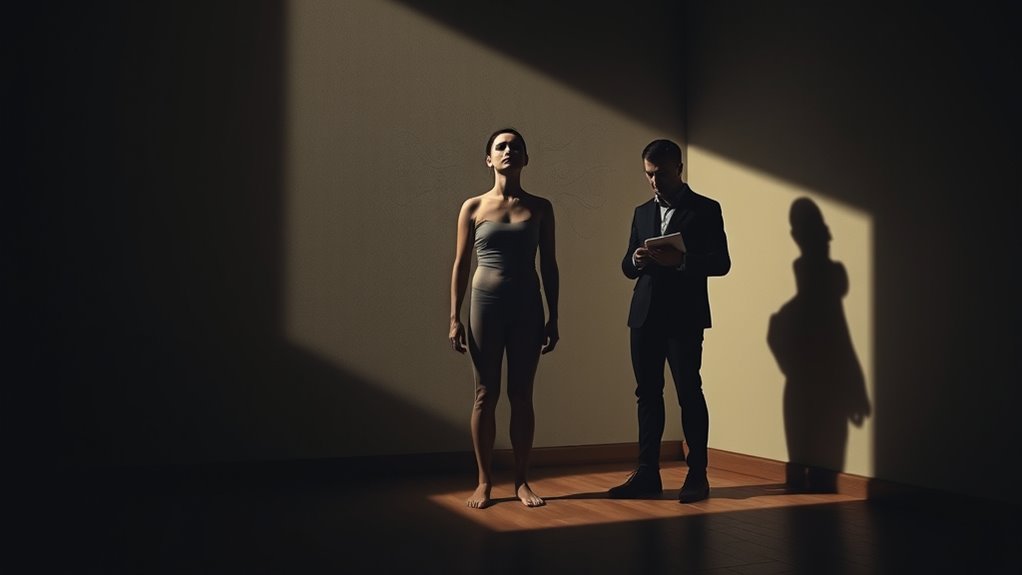
Belief in the paranormal is closely tied to cognitive style, particularly how you process information. If you lean towards intuitive thinking, you might find yourself more open to paranormal beliefs.
Intuitive thinkers often embrace quick, instinctual solutions and are comfortable with ambiguity, allowing them to interpret unclear stimuli as ghostly phenomena.
In contrast, if you have an analytical cognitive style, you likely rely on logical reasoning and empirical evidence, making it easier to dismiss such experiences.
Your intolerance for ambiguity could lead you to seek rational explanations, reducing the likelihood of believing in or experiencing ghosts.
Ultimately, your cognitive style plays a significant role in shaping your views on the supernatural and your openness to ghost sightings.
Personality Traits and Their Influence on Ghost Sightings
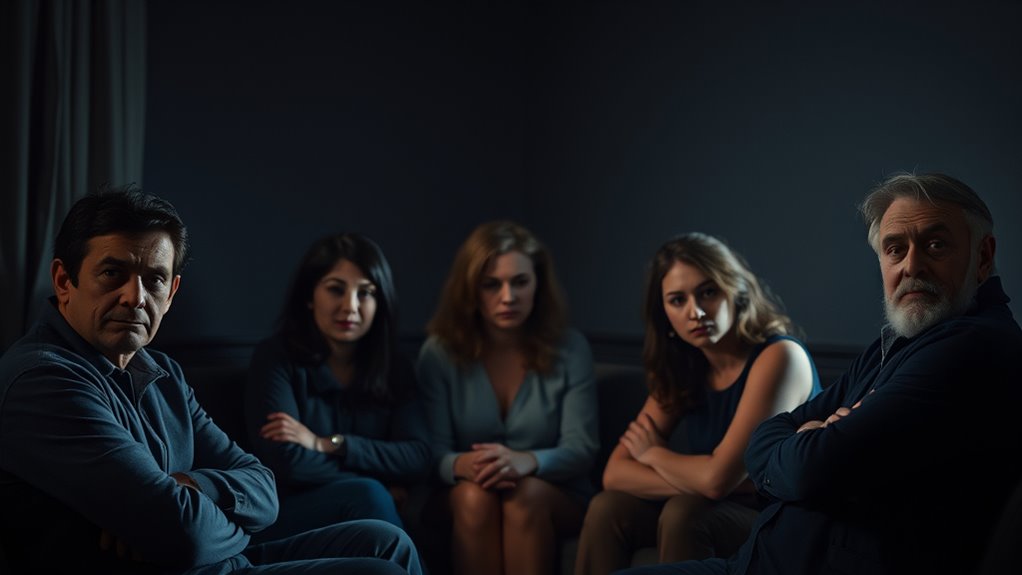
While many factors contribute to whether someone experiences ghost sightings, personality traits play a significant role in shaping these encounters.
If you have an analytic cognitive style, you might prioritize logical reasoning over paranormal beliefs, making you less likely to see ghosts. Similarly, high extraversion and lower openness can reduce your chances of believing in or experiencing ghost sightings.
If you’re intolerant of ambiguity, you’ll likely feel less unease, diminishing your likelihood of perceiving ghostly presences. On the other hand, if you’re more industrious, you may find yourself less inclined to report encounters, while comfort with ambiguity can increase feelings of creepiness and heighten your susceptibility to interpreting unclear stimuli as ghostly experiences.
The Impact of Religious Background on Belief in Ghosts
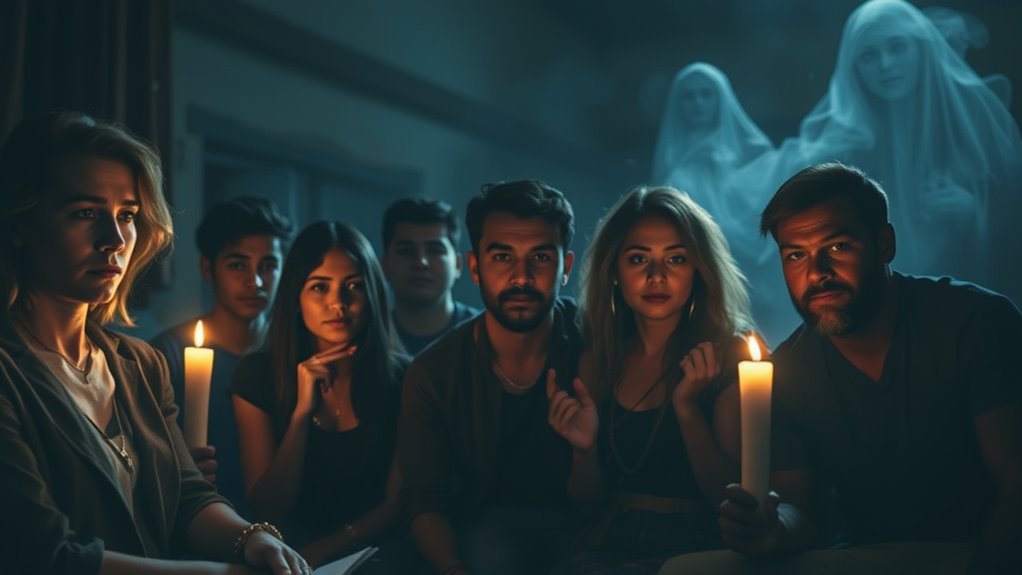
Religious background greatly influences how you perceive ghosts and the supernatural. If you’re very religious, you might’ve a lower belief in ghosts, as your faith often teaches that spirits don’t exist.
On the other hand, if you don’t attend church regularly, you may find yourself more open to the idea of ghosts, suggesting that personal spirituality plays a role. Nonbelievers and deeply devout individuals usually exhibit a similar skepticism towards belief in ghosts, showing how convictions shape your interpretation of supernatural experiences.
Most religions provide explanations for what happens after death, which can profoundly impact your beliefs about ghosts and the afterlife. Ultimately, your religious views guide how you interpret the world around you.
Psychological Factors That Shape Perception
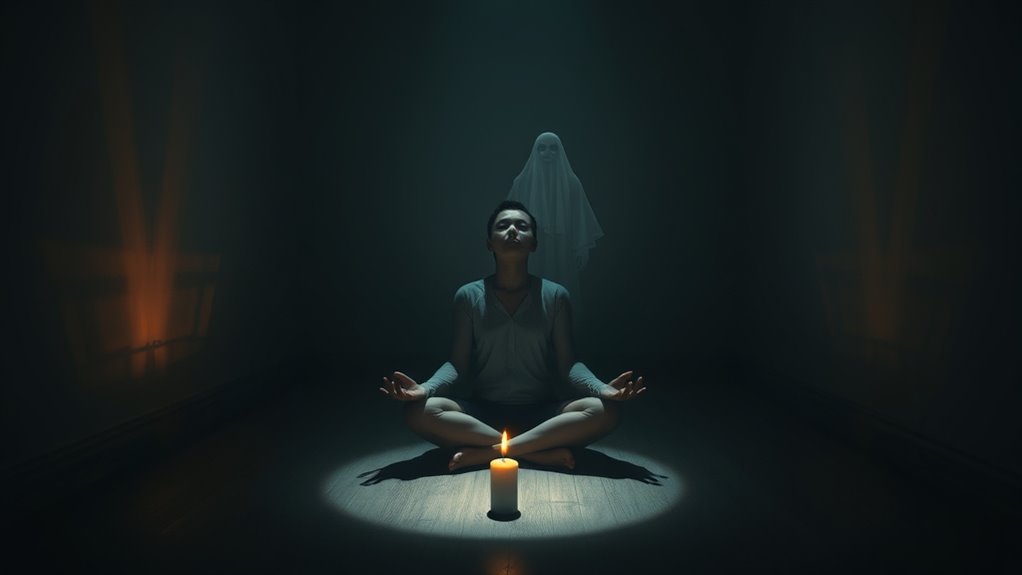
When it comes to perceiving ghosts, psychological factors play a crucial role in shaping your experiences. If you don’t believe in the supernatural, you’re less likely to notice a ghostly presence.
Your cognitive style also matters; intuitive thinkers might embrace paranormal beliefs, while analytical types often dismiss them. Emotional states like stress can amplify your susceptibility to ghost sightings, making you more prone to perceive unusual events.
If you’re intolerant of ambiguity, you might interpret vague stimuli as ghostly presences, whereas those comfortable with uncertainty might not. Additionally, if you’ve been exposed to ghost stories or haunted locations, your suggestibility increases, heightening the chance of experiencing something eerie compared to those who remain skeptical.
Environmental Influences on Ghost Sightings
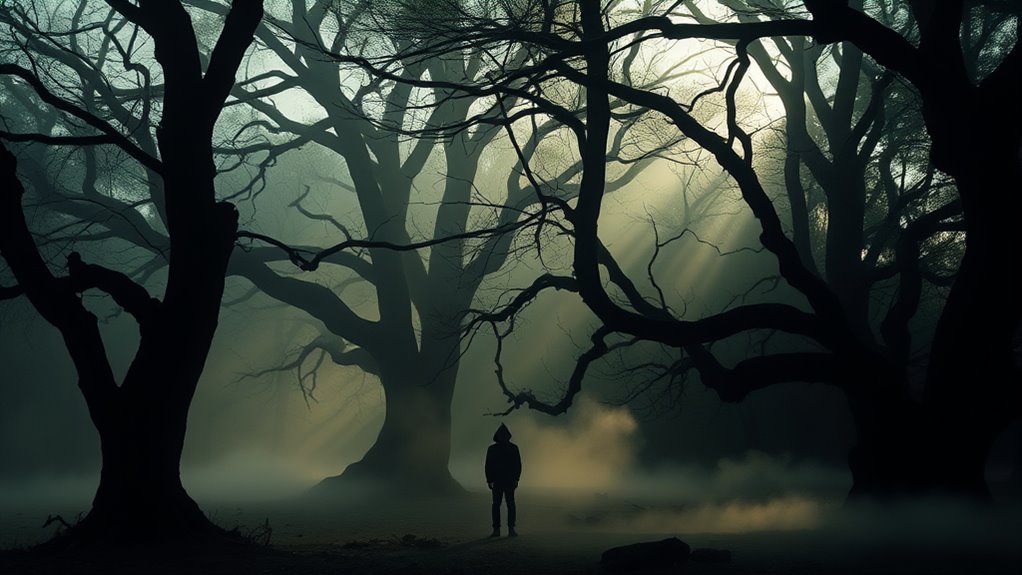
Environmental factors can considerably influence your perception of ghost sightings, especially in settings that carry historical significance.
Old buildings, with their emotional weight, often heighten your sensitivity to strange occurrences. Atmospheric conditions, like low light levels and ambient noise, create an uneasy ambiance that can amplify your ghost sightings.
Old buildings and eerie atmospheres heighten sensitivity to the supernatural, amplifying ghost sightings in their haunting embrace.
Additionally, infrasound—low-frequency sound waves—might induce discomfort, leading you to misinterpret sensations as supernatural. You might also notice temperature changes in these environments, which can feel eerie and contribute to the belief in ghostly presences.
Finally, the cultural context surrounding death influences your interpretation of experiences, shaping how you perceive these encounters.
Together, these environmental influences play a vital role in your ghost sighting experiences.
The Science of Hallucinations and Brain Chemistry
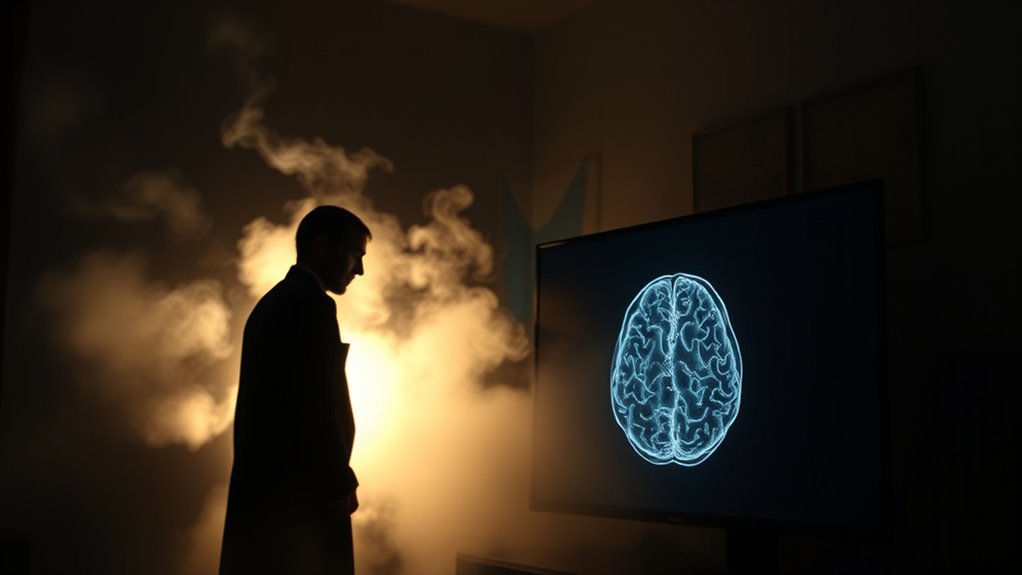
When you think about ghost sightings, it’s essential to take into account how brain chemistry impacts perception.
Changes in neurotransmitters can lead to hallucinations, influencing what you might experience in certain situations.
Understanding these dynamics can shed light on why some people never encounter the supernatural.
Brain Chemistry Dynamics
Although many people dismiss ghost sightings as mere fiction, the science of brain chemistry reveals that these experiences often stem from complex neurological processes. Disruptions in communication between brain regions can trigger hallucinations, influencing your perception of a presence in the room. Environmental stressors, like isolation or high altitude, can further alter brain chemistry dynamics, intensifying these episodes.
| Brain Region | Impact on Experience | Triggering Factors |
|---|---|---|
| Frontal Lobe | Decision Making | Stress |
| Temporal Lobe | Memory Recall | Sleep Deprivation |
| Parietal Lobe | Spatial Awareness | High Altitude |
| Limbic System | Emotional Response | Isolation |
| Occipital Lobe | Visual Processing | Drug Influence |
These dynamics highlight how psychological experiences of seeing ghosts are rooted in neurological processes.
Hallucinations and Perception
While many people believe they’ve encountered ghosts, science shows that these experiences often stem from complex brain processes. Hallucinations can occur when communication between brain regions, like the frontal and temporal lobes, is disrupted, causing misperceptions of ghostly presences.
Research indicates that stimulating areas between the temporal and parietal lobes can even evoke sensations of presence or apparitions. Environmental factors, such as low light, can amplify your susceptibility to these hallucinations, making some individuals more likely to perceive ghostly figures.
Additionally, your psychological predispositions, like cognitive style and personality traits, influence how readily you experience these phenomena. The brain’s tendency to fill in sensory gaps can lead to false perceptions, especially in emotionally charged situations. Furthermore, individuals with certain mental health issues may be at a higher risk for experiencing these types of hallucinations.
Role of Neurotransmitters
Neurotransmitters are essential players in shaping how you perceive the world, and their balance can greatly influence whether you experience hallucinations, including ghost sightings.
Key neurotransmitters like dopamine and serotonin regulate your mood and sensory perceptions. When these neurotransmitters are disrupted, you might encounter altered perceptions that can lead to hallucinations perceived as ghostly encounters.
Heightened stress and anxiety can further affect neurotransmitter activity, increasing your susceptibility to experiencing these phenomena, especially in emotionally charged situations.
If you have a neurochemical predisposition or heightened sensitivity in your neurotransmitter receptor activity, you may be more prone to perceiving ghostly presences.
Research supports the connection between neurotransmitter function and hallucinations, especially under extreme environmental conditions.
The Effect of Fear on Perception and Experience

When you’re afraid, your senses heighten, making you more likely to misinterpret shadows or sounds in the dark.
This instinctive response, shaped by evolution, can trick your mind into perceiving ghostly presences where there are none.
In moments of fear, your brain looks for patterns, amplifying the chance of experiencing the supernatural.
Fear Heightens Sensory Perception
Fear has a way of sharpening your senses, making you more attuned to your surroundings in ways you mightn’t even realize. This heightened perception can lead to misinterpretations of shadows and sounds, amplifying your belief in the supernatural.
In emotionally charged situations, you might find yourself more susceptible to ghost sightings due to:
- Increased vigilance and sensitivity to stimuli
- Stress and anxiety amplifying your emotional responses
- The brain’s fear response triggering irrational thinking
These factors contribute to a distorted view of reality, making you more likely to perceive ghosts where none exist.
When you’re afraid, your perception shifts, turning ordinary experiences into ghostly encounters, reinforcing the cycle of fear and belief in the paranormal.
Misinterpretation of Environmental Cues
Although you might not realize it, your surroundings can easily be misinterpreted, especially in moments of heightened anxiety. Fear increases sensitivity to perceived threats, leading you to misinterpret environmental cues as ghostly presences. Low light and unexpected noises can distort your perception, making harmless sounds seem sinister. If you believe in ghosts, you might experience pareidolia, seeing faces in shadows or patterns, intensifying these misinterpretations. Additionally, suggestibility plays a role; hearing ghost stories can prime you to perceive unusual sensations.
| Factor | Effect on Perception |
|---|---|
| Fear | Heightens sensitivity to threats |
| Environmental Cues | Distorts interpretation of stimuli |
| Belief in Ghosts | Increases likelihood of pareidolia |
Evolutionary Responses to Darkness
As night falls and darkness envelops your surroundings, your brain instinctively shifts into a heightened state of vigilance. This evolutionary response to fear makes you more alert to potential threats, increasing the chances of misinterpreting sensory information.
You might find yourself perceiving ghostly presences due to:
- Shadows playing tricks on your mind
- Sounds echoing in eerie ways
- Emotional distress amplifying your senses
The amygdala, a key player in your fear response, heightens sensitivity to these ambiguous cues. When fear takes hold, it can lead to irrational thinking, making ghost sightings feel more real.
In these moments, heightened emotions can blur the line between reality and imagination, intensifying your experiences of the supernatural.
Cultural Contexts and Their Role in Ghost Beliefs
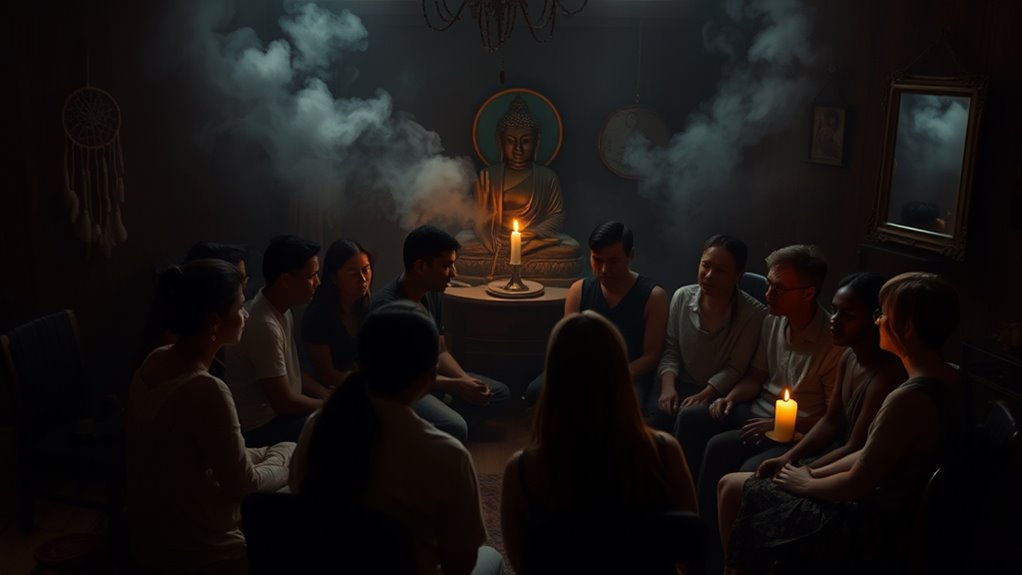
Cultural contexts play an essential role in shaping how individuals perceive and respond to ghostly encounters. Your cultural beliefs and traditions profoundly influence whether you believe in ghosts or dismiss such experiences.
In many societies, ghost stories are woven into folklore, guiding attitudes toward the supernatural. If you come from a culture steeped in skepticism and scientific reasoning, you might be less likely to report sightings.
Additionally, rituals surrounding death impact how spiritual encounters are viewed, often shaping your willingness to acknowledge them. If your religious background offers clear explanations for the afterlife, you may find it harder to believe in ghosts compared to those with more ambiguous spiritual views.
Ultimately, your cultural context deeply affects your ghostly experiences.
The Importance of Social Interactions in Shaping Beliefs
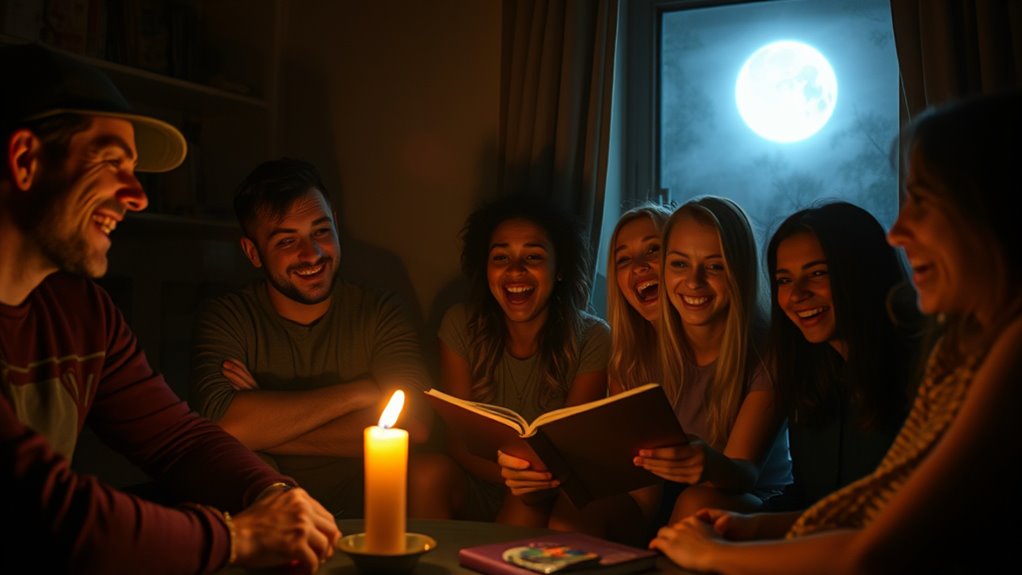
Your beliefs about ghosts aren’t shaped solely by cultural context; social interactions play a significant role as well. When you share experiences with friends or family, it reinforces your beliefs and creates a communal understanding of the supernatural.
Consider how:
- Media portrayals of ghosts influence conversations, heightening collective belief.
- Community experiences with sightings validate personal claims, even for skeptics.
- Social isolation can lead to a lack of reinforcement, making ghost sightings less likely.
These interactions can shape your perceptions, making you more open or skeptical about the paranormal. Engaging with others who discuss these topics can deepen your beliefs, while those who remain isolated may miss out on the communal reinforcement that fuels ghostly convictions.
Frequently Asked Questions
Why Do Some People See Ghosts and Some Don’t?
Some people see ghosts while others don’t due to a combination of belief, cognitive style, and emotional states.
If you’re open-minded and comfortable with ambiguity, you might be more likely to perceive ghostly phenomena. Conversely, if you rely on analytical thinking, you might dismiss such experiences.
Environmental factors like stress can also heighten sensitivity to the supernatural, making you more prone to sightings when you’re feeling anxious or overwhelmed.
What Percentage of People Have Seen Ghosts?
In the tapestry of human experience, threads of the supernatural weave through lives. About 18% of Americans claim they’ve glimpsed a ghost, those ethereal whispers of the past.
You might wonder what stirs this intrigue, as nearly 29% have felt a connection to the departed.
With 75% of folks embracing at least one paranormal belief, it’s clear the unseen dances just beyond the veil, inviting curiosity and wonder into your world.
Are There People Who Can See Ghosts?
Yes, there are people who claim they can see ghosts. Many of these individuals believe in the supernatural, which influences their perception.
If you have an intuitive cognitive style or experience high levels of stress, you might be more open to these encounters. Cultural and religious beliefs also shape your openness to ghost sightings.
What Makes You Afraid of Ghosts?
Fear of ghosts often creeps in like a shadow at dusk, unsettling your mind.
You might feel afraid due to heightened emotions or anxiety, especially during stressful times.
Your past experiences and beliefs can amplify this fear, making you more suggestible to the supernatural.
Environmental factors, like dim lighting or strange sounds, can trigger your imagination, leading you to interpret harmless stimuli as ghostly presences, deepening your sense of dread.
Conclusion
In the end, whether you see ghosts or not often boils down to belief and perception. Like a painter with a blank canvas, your mind shapes reality based on your experiences and traits. If you’re open to the possibility, you might just catch a glimpse of the unseen. But for others, the veil remains intact, leaving them in a world untouched by the supernatural. Embrace your perspective; after all, every vision is uniquely yours.
